indireinforma

In the last 7 years the Erasmus+ programme recorded a sharp increase of Italian participation in people’s mobility activities and in the development of cooperation projects in Europe.
“Erasmus+ demonstrated over the years all its extraordinary vitality and its effective utility” – Flaminio Galli, director of the Indire’s Erasmus+ agency which manages the university, school and adult education sectors of the programme, declared. “In spite of any specific or critical situation, the programme continues to carry out its mission: opening up opportunities, creating links, and enriching people. The future of Erasmus+ is expected to be solid as it will continue funding initiatives to promote knowledge and awareness, and the sense of citizenship and belonging to the EU. In the 2021-2027 period a strong investment in the Italian citizens is foreseen, in their competences, and in particular in their green and digital knowledge, in order to address global challenges awaiting us”.
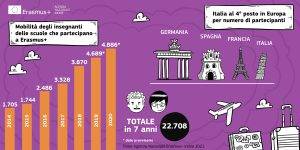
SCHOOL
Thanks to the learning mobility projects, schools have sent teachers and school staff in other parts of Europe for teaching, training and job shadowing experiences (i.e., field observation activities). From 2014 to today, 1,066 projects have been authorized in Italy, for a total of 22,708 teachers who have carried out mobility in Europe, with a total funding of almost 49 million euros (source: Erasmus+ in brief – School Staff Learning Mobility).
Regarding the exchange of good practices between European schools, the data at national level revealed 4,275 authorized projects, of which 608 coordinated by Italian schools
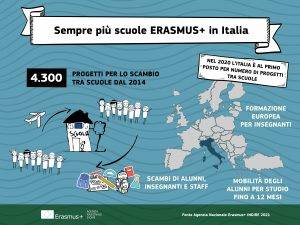
and 3,667 with partner schools within projects coordinated by schools of other countries, for a total funding of over 110 million euros.
Since 2014, a total of 248 Strategic partnerships, coordinated by Italian schools have been approved for a total funding of 67 million Euros (source Erasmus+ in brief – Cooperation for innovation and the exchange of good practices in school education).
There are currently more than 900 thousand teachers from 43 countries registered in the eTwinning platform (the Italian unit is managed by Indire). Also due to the health emergency, a significant increase in the enrolment of teachers was recorded last year, reaching today a total of 91,600 registered teachers of Italian schools (over 10% of the European total), with more than 32 thousand distance learning projects carried out in collaboration with other foreign institutes (info: https://etwinning.indire.it).
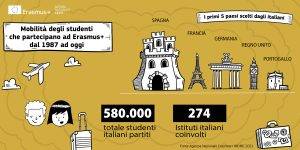
UNIVERSITY (mobility in the EU)
From the beginning of the program (1987) to today, the total number of Italian university students involved in mobility for study or traineeship has been about 580 thousand. In the last 7 years alone, 242 thousand Italian students have left Italy. This figure has allowed Italy to rise from fourth to third position (after Spain and France) regarding student mobility towards different European destinations. As far as hospitality is concerned, our country is in third place, after Spain and France, with over 162,000 European students who in the last 7 years have chosen Italy for a period of study.
Overall, the Erasmus + Indire Agency accepted 274 applications from Higher Education Institutes for the exchange activities envisaged with the Programme Countries.
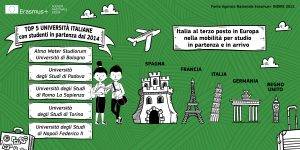
The Higher education institutions of Lombardy, Emilia-Romagna, Lazio, Veneto, Campania and Tuscany registered the highest participation of Erasmus + students. According to disaggregated data, the “Alma Mater” University of Bologna ranks first. This is followed by the University of Padua, the University of Rome “Sapienza”, the University of Turin and the University of Naples “Federico II”, which slightly precedes the State University of Milan.
UNIVERSITY (extra-EU mobility)
Since 2015, the year in which International Credit Mobility began, 3,467 students and staff from Italy have chosen non-EU countries as their destination for a study or internship period. There were 8,505 incoming mobilities from non-European countries among students, teachers and academic staff.
IDENTIKIT OF THE ERASMUS STUDENT
The Italian Erasmus student who has chosen Europe as his/her destination is on average 23 years old, or 25 if an intern. In 59% of cases, the student is female, a value that rises to 63% when the purpose of the mobility is an internship in a company. Spain, France, Germany and Portugal are the countries with which most exchanges for study are carried out, with an average stay of 6 months. Spain, the United Kingdom, Germany and France are preferred, in this order, for internships, which last on average 3 months.
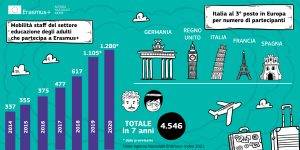
ADULTS
Since 2014, the Agency has funded 4,546 mobility grants in Europe for people involved in adult education, this was the result of 211 winning projects presented by national organizations, for over 8 million euros funding. On the cooperation side, 237 strategic partnerships coordinated by Italian institutions and oriented towards innovation and the exchange of good practices between public sector and civil society organizations engaged in adult education were authorized. The financial commitment to support these projects was over 48 million euros (sources: Erasmus+ in brief – Mobility for learning staff in adult education and Erasmus+ in brief – Cooperation for innovation and exchange of good practices in adult education).
Epale, the European electronic platform for adult education professionals, also operates in the field of adult learning. With over 7,600 Italian members, the community offers the opportunity to interact with about 83,000 users in Europe, creating transversal synergies between networks of experts. In Italy, the platform is managed by the Epale National Unit, which is based at Indire (info: https://epale.ec.europa.eu/it).

